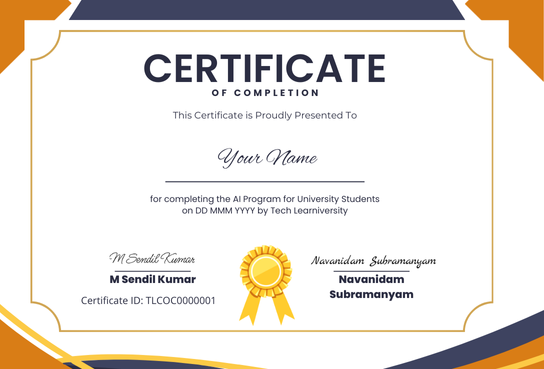AI Program for University
The AI Program for University Students offers an engaging, hands-on curriculum that introduces children aged 17+ to the exciting world of artificial intelligence through interactive projects and coding activities.
- Home Main
- AI Program for University
Course Details
From: Tech Learniversity
Start Day: Coming Soon
Project Duration: 120 Hours
Get in Touch with Tech Learniversity
Call us directly or email us!
Address Business
Hindustan C. Bus Stop,
Lal Bahadur Shastri Rd,
Gandhi Nagar, Vikhroli West,
Mumbai - 400079,
Maharashtra, India
Contact With Us
HR: (+91) 70217 89240
business@techlearniversity.com
hr@techlearniversity.com
Working Time
Holiday : Closed

AI Program for University
The AI Program for University is a comprehensive 120-hour curriculum designed to equip learners with both foundational and advanced skills in artificial intelligence. Covering topics from AI fundamentals and Python programming to machine learning, deep learning, and advanced AI applications, this program emphasizes hands-on projects and real-world industry applications, preparing students for successful careers in AI while highlighting ethical considerations and practical deployment strategies.The AI Program for University Students is a comprehensive 120-hour curriculum designed to equip learners with both foundational and advanced skills in artificial intelligence. Covering topics from AI fundamentals and Python programming to machine learning, deep learning, and advanced AI applications, this program emphasizes hands-on projects and real-world industry applications, preparing students for successful careers in AI while highlighting ethical considerations and practical deployment strategies.The AI Program for University Students is a comprehensive 120-hour curriculum designed to equip learners with both foundational and advanced skills in artificial intelligence. Covering topics from AI fundamentals and Python programming to machine learning, deep learning, and advanced AI applications, this program emphasizes hands-on projects and real-world industry applications, preparing students for successful careers in AI while highlighting ethical considerations and practical deployment strategies.The AI Program for University Students is a comprehensive 120-hour curriculum designed to equip learners with both foundational and advanced skills in artificial intelligence. Covering topics from AI fundamentals and Python programming to machine learning, deep learning, and advanced AI applications, this program emphasizes hands-on projects and real-world industry applications, preparing students for successful careers in AI while highlighting ethical considerations and practical deployment strategies.
Course Overview
The AI Program for University is a comprehensive 120-hour curriculum designed to equip learners with foundational and advanced skills in artificial intelligence. Covering topics from AI fundamentals and Python programming to machine learning, deep learning, and advanced AI applications, this program emphasizes hands-on projects and real-world industry applications, preparing students for successful careers in AI while highlighting ethical considerations and practical deployment strategies.The AI Program for University Students is a comprehensive 120-hour curriculum designed to equip learners with foundational and advanced skills in artificial intelligence. Covering topics from AI fundamentals and Python programming to machine learning, deep learning, and advanced AI applications, this program emphasizes hands-on projects and real-world industry applications, preparing students for successful careers in AI while highlighting ethical considerations and practical deployment strategies.The AI Program for University Students is a comprehensive 120-hour curriculum designed to equip learners with foundational and advanced skills in artificial intelligence. Covering topics from AI fundamentals and Python programming to machine learning, deep learning, and advanced AI applications, this program emphasizes hands-on projects and real-world industry applications, preparing students for successful careers in AI while highlighting ethical considerations and practical deployment strategies.The AI Program for University Students is a comprehensive 120-hour curriculum designed to equip learners with foundational and advanced skills in artificial intelligence. Covering topics from AI fundamentals and Python programming to machine learning, deep learning, and advanced AI applications, this program emphasizes hands-on projects and real-world industry applications, preparing students for successful careers in AI while highlighting ethical considerations and practical deployment strategies.
Course Type
The AI Program for University is categorized as an online instructor-led, project-based course. This format allows students to actively engage in learning through hands-on projects and collaborative activities, ensuring they gain practical experience while exploring advanced AI concepts and applications over the 120-hour curriculum.The AI Program for University Students is categorized as an online instructor-led, project-based course. This format allows students to actively engage in learning through hands-on projects and collaborative activities, ensuring they gain practical experience while exploring advanced AI concepts and applications over the 120-hour curriculum.The AI Program for University Students is categorized as an online instructor-led, project-based course. This format allows students to actively engage in learning through hands-on projects and collaborative activities, ensuring they gain practical experience while exploring advanced AI concepts and applications over the 120-hour curriculum.The AI Program for University Students is categorized as an online instructor-led, project-based course. This format allows students to actively engage in learning through hands-on projects and collaborative activities, ensuring they gain practical experience while exploring advanced AI concepts and applications over the 120-hour curriculum.
Course Objectives
2. Advance Technical Proficiency: Enhance students’ abilities in deep learning, natural language processing, and computer vision through hands-on projects and real-world applications.
3. Foster Ethical AI Practices: Instill a strong sense of ethics, fairness, and responsibility in AI development and deployment, preparing students to address challenges in the tech industry.
4. Prepare for Industry Applications: Provide practical experience in deploying AI solutions across various sectors, ensuring students are ready for careers in AI and related fields.
5. Encourage Innovation and Problem-Solving: Cultivate creativity and critical thinking by engaging students in capstone projects that require innovative solutions to complex problems.
Duration
120 Hours
Requirements
2. Technical Skills: Familiarity with Python programming is recommended, as it is the primary language used throughout the course.
3. Internet Access: Reliable internet access is necessary to participate in the online instructor-led sessions and complete assignments.
4. Software Requirements: Students may need to install specific software such as Python IDEs (e.g., Jupyter Notebook or Google Colab) and libraries like NumPy, Pandas, and TensorFlow.
5. Commitment to Learning: A willingness to engage with course materials, complete projects, and collaborate with peers throughout the program’s duration is essential. 6. Time Management: Ability to dedicate sufficient time to attend sessions, complete assignments, and participate in group projects over the 120-hour curriculum.
Pre-requisites
2. Technical Skills: Familiarity with Python programming is recommended, as it is the primary language used throughout the course.
3. Internet Connectivity: A stable internet connection is essential for attending online classes and accessing course materials.
4. Software Installation: Required software such as Python IDEs (e.g., Jupyter Notebook or Google Colab) and libraries like NumPy, Pandas, and TensorFlow should be installed on their devices prior to starting the program.
5. Commitment to Learning: An eagerness to engage with course content, complete projects, collaborate with peers, and actively participate throughout the program’s duration is important.
6. Time Management: Ability to dedicate sufficient time to attend sessions, complete assignments, and participate in group projects over the 120-hour curriculum.
Target Audience
2. Aspiring AI Professionals: Students and professionals looking to transition into AI-related fields and seeking comprehensive training in AI technologies.
3. STEM Enthusiasts: Learners with a background in science, technology, engineering, or mathematics who wish to deepen their understanding of AI applications.
4. Career Changers: Professionals from non-technical backgrounds aiming to pivot into the tech industry, particularly in roles related to AI and machine learning.
5. Educators and Researchers: Academics and researchers interested in incorporating AI into their work or teaching AI concepts to others.
6. Tech Innovators: Individuals passionate about leveraging AI to drive innovation and solve complex problems in various industries.
Career and Future Prospects
2. Growing Job Market: Careers in Artificial Intelligence and data science are among the fastest-growing fields, with roles such as AI specialists, data analysts, and machine learning engineers projected to see significant growth over the next decade.
3. Diverse Career Paths: Graduates can pursue a variety of career paths, including: – Artificial Intelligence Specialist – Data Scientist – Machine Learning Engineer – Software Developer – Robotics Engineer
4. Preparation for Advanced Studies: The program prepares students for higher education in STEM fields, particularly those focused on technology and innovation.
5. Future-Proofing Careers: As industries continue to evolve with advancements in technology, having a background in AI provides students with a competitive edge in the job market.
6. Ethical Considerations: Understanding responsible AI practices instills a sense of ethics that is crucial for future professionals working within this rapidly evolving field.
Projects
Designation/Title
Graduates of this program typically pursue roles such as:
– Junior Business Analyst
– Business Analyst
– Senior Business Analyst
– Business Intelligence Analyst (with additional BI skillset)
– Business Solutions Architect
– Product Owner (in Agile environments)
Projects
Hands-on projects are embedded in each module:
1. Enterprise Analysis
– Conduct a SWOT and PESTLE assessment for a hypothetical expansion project.
– Develop a vision statement and business case with cost-benefit and risk analysis.
2. Requirements Elicitation & Documentation
– Perform interviews and workshops (role-play scenarios) to gather user requirements.
– Document findings using use cases, user stories, and BPMN diagrams.
3. Modeling & Design Definition
– Create AS-IS and TO-BE process models in Visio or Lucidchart.
– Draft wireframes/mockups in Figma illustrating proposed UI changes.
4. Solution Evaluation
– Use a root cause analysis (Ishikawa diagram) to propose corrective measures.
– Develop and execute a UAT plan for sample requirements in Jira.
5. SQL & Data Visualization
– Basic SQL queries to retrieve and update test data.
– Build a simple Power BI or Tableau dashboard for a mock project.
6. Capstone Project
– Consolidate all phases—from requirements and process modeling to testing and solution evaluation—on a real or simulated business problem.
– Present a coherent analysis, solution blueprint, and final recommendations.
Salary
₹5 LPA – ₹12 LPA
$65,000 – $95,000
CA$60,000 – CA$90,000
£35,000 – £55,000
AU$70,000 – AU$100,000
2. Capstone Project: The program culminates in a capstone project where students work collaboratively to design, develop, and deploy an AI solution. This comprehensive project integrates skills from all previous levels and showcases their ability to solve real-world problems.
3. Project-Based Learning Approach: Each session includes practical activities and projects that encourage creativity and problem-solving, ensuring students can relate theoretical knowledge to real-world applications.
4. Diverse Topics for Projects: – Machine Learning Models: Developing models for tasks such as image recognition or sentiment analysis. – Natural Language Processing Applications: Building chatbots or text classifiers. – Computer Vision Projects: Implementing projects that involve image classification or face detection. – AI-based Games: Creating simple games using Python.
5. Collaboration & Presentation Skills: Students work in groups on projects, fostering teamwork and communication skills. They also present their projects at the end of each level, enhancing their public speaking abilities.
6. Portfolio Development: Throughout the program, completed projects contribute to a portfolio that students can showcase in future educational endeavors or career opportunities.
Features
2. Hands-On Learning: Emphasizes project-based activities and mini-projects at each level to reinforce theoretical knowledge through practical application.
3. Diverse Topics Covered: Includes foundational and advanced topics such as Python programming, machine learning, deep learning, natural language processing, computer vision, and AI ethics.
4. Capstone Project: Culminates in a capstone project where students apply their skills to real-world problems, showcasing their ability to design and deploy AI solutions.
5. Engaging Teaching Methods: Utilizes interactive sessions, case studies, and collaborative projects to make learning engaging and relevant to industry needs.
6. Ethics in AI Education: Incorporates discussions on responsible AI practices to ensure students understand ethical considerations in technology use.
7. Certification of Completion: Students receive certificates upon completing each level, validating their skills and enhancing their educational credentials.
8. Online Instructor-Led Format: Delivered through an online platform with experienced instructors who provide guidance and support throughout the course.
Benefits
2. Hands-On Projects: Engaging in hands-on activities and mini-projects helps reinforce learning and allows students to apply theoretical knowledge in real-world scenarios.
3. Skill Development: Participants develop critical skills such as problem-solving, creativity, teamwork, and effective communication through collaborative projects.
4. Portfolio Creation: By completing various projects throughout the program, students build a portfolio that showcases their skills and achievements to future educators or employers.
5. Ethical Awareness: The program emphasizes responsible AI practices, teaching students about ethics, fairness, and safety in technology use.
6. Certification Opportunities: Students receive certificates upon completion of each level, providing recognition of their accomplishments that can enhance their academic profiles.
7. Preparation for Future Careers: Exposure to AI technologies prepares students for potential careers in STEM fields while fostering an interest in further studies related to technology and innovation.
8. Interactive Learning Environment: The online instructor-led format promotes interaction with peers and instructors, creating a supportive community for learning and collaboration.
9. Increased Curiosity About Technology: The engaging curriculum sparks curiosity about how technology works and its impact on daily life, encouraging lifelong learning.
10. Future-Ready Skills: By acquiring foundational knowledge in AI, students position themselves advantageously for future educational opportunities and career paths within the tech industry.
The Results
Skill Acquisition: Students will develop essential skills in coding, machine learning, natural language processing (NLP), computer vision, and other key areas of artificial intelligence.
Portfolio Development: Participants will create a portfolio showcasing their completed projects, including mini-projects from each level and a capstone project that demonstrates their comprehensive understanding of AI concepts.
Certification of Completion: Students will receive certificates upon finishing each level of the program as well as a certificate for their capstone project, validating their achievements in AI education.
Enhanced Problem-Solving Abilities: Through hands-on projects and collaborative work, students will improve their critical thinking and problem-solving skills applicable to real-world scenarios.
Increased Interest in STEM Fields: The engaging curriculum is designed to spark curiosity about technology and its applications, potentially leading students to pursue further studies or careers in STEM disciplines.
Ethical Understanding: Students will gain insights into responsible AI practices, including ethical considerations related to fairness and safety in technology use.
Future Career Readiness: By acquiring foundational knowledge in AI, students position themselves advantageously for future educational opportunities or careers within rapidly evolving tech industries.
Collaborative Skills: Working on group projects fosters teamwork and communication abilities that are valuable both academically and professionally.
Confidence Building: Presenting projects enhances public speaking skills and builds confidence in sharing ideas with peers and instructors.
Lifelong Learning Mindset: Exposure to cutting-edge technologies encourages a mindset geared towards continuous learning as they explore advancements beyond the program's scope.
Batch Details
Batch Start Date: Coming Soon
Batch End Date: Coming Soon
Batch Timings: Coming Soon
Batch Days: Coming Soon
Next Batch: Coming Soon
Batch Start Date: Coming Soon
Batch End Date: Coming Soon
Batch Timings: Coming Soon
Batch Days: Coming Soon
Next Batch: Coming Soon
Curriculum
1. Introduction to AI – Definitions, history, types.
2. AI Applications in industries (healthcare, finance, HR, manufacturing).
3. Basics of Data – Types, quality, collection.
4. Introduction to Python for AI – Setup & environment (Jupyter/Colab).
5. Python basics – Variables, data types.
6. Python basics – Operators, expressions.
7. Python control flow – If-else, loops.
8. Python functions.
9. Python data structures – Lists, tuples.
10. Python dictionaries & sets.
11. Strings in Python (NLP basics intro).
12. File handling (CSV, TXT).
13. Libraries for AI – NumPy basics.
14. Libraries for AI – Pandas basics.
15. Libraries for AI – Matplotlib basics.
16. Data visualization mini-project.
17. Introduction to Machine Learning concepts.
18. Supervised vs Unsupervised learning overview.
19. Linear Regression basics.
20. Logistic Regression basics.
21. Mini Hands-on: Predict student marks dataset.
22. Mini Hands-on: Predict survival on Titanic dataset.
23. Ethics in AI – Bias, fairness, responsibility.
24. Mini Project Presentation (Level 1).
1. Recap of ML basics.
2. Workflow of ML project (Data → Train → Test → Deploy).
3. Data Preprocessing – Cleaning, handling missing values.
4. Feature Engineering & Selection.
5. Train-Test Split & Cross Validation.
6. Supervised Learning – Decision Trees.
7. Supervised Learning – Random Forest.
8. Supervised Learning – SVM.
9. Supervised Learning – k-NN.
10. Evaluation Metrics – Accuracy, Precision, Recall, F1.
11. Classification Hands-on: Iris dataset.
12. Regression Hands-on: House Price dataset.
13. Unsupervised Learning – Clustering (k-means).
14. Unsupervised Learning – Hierarchical clustering.
15. Dimensionality Reduction – PCA.
16. Association Rule Learning – Apriori.
17. Recommendation Systems – Collaborative Filtering.
18. Hands-on: Movie Recommendation System.
19. ML Deployment Basics – Pickle/Joblib.
20. Model Tuning – GridSearchCV, Hyperparameters.
21. Bias & Variance – Overfitting vs Underfitting.
22. Mini Project: Spam Email Classifier.
23. Mini Project: Loan Approval Prediction.
24. Project Presentation (Level 2).
1. What is Deep Learning? ANN basics.
2. Structure of Neural Networks – Neurons, weights, activation functions.
3. Forward Propagation explained.
4. Backpropagation explained.
5. Introduction to TensorFlow & Keras.
6. Building first ANN model.
7. Hands-on: Predict MNIST digits.
8. Activation Functions – Sigmoid, ReLU, Softmax.
9. Loss functions & optimizers.
10. CNN (Convolutional Neural Networks) intro.
11. CNN architecture explained.
12. Hands-on: CNN on CIFAR-10 dataset.
13. Transfer Learning (VGG, ResNet).
14. RNN (Recurrent Neural Networks) basics.
15. LSTM (Long Short-Term Memory) explained.
16. Hands-on: Text generation using RNN.
17. Autoencoders – Concept.
18. GANs – Introduction & applications.
19. Hands-on: Build a simple GAN (MNIST).
20. Hyperparameter tuning in DL.
21. Regularization (Dropout, BatchNorm).
22. Deployment of DL models.
23. Mini Project: Image Classifier (custom dataset).
24. Project Presentation (Level 3).
1. Natural Language Processing – Introduction.
2. Text preprocessing – Tokenization, stopwords.
3. Bag of Words & TF-IDF.
4. Hands-on: Spam detection with NLP.
5. Word Embeddings – Word2Vec, GloVe.
6. Advanced NLP – Transformers intro.
7. BERT & GPT overview.
8. Hands-on: Sentiment Analysis with BERT.
9. Computer Vision – Intro & applications.
10. Image preprocessing – Resizing, normalization.
11. Hands-on: Face detection with OpenCV.
12. Hands-on: Object detection with pre-trained model (YOLO/Faster R-CNN).
13. Transfer Learning in CV.
14. Cloud AI Services – Google AI, Azure ML, AWS AI.
15. Hands-on: Deploy ML model on Cloud (Colab/Streamlit).
16. AI APIs – Speech, Translation, Vision APIs.
17. Hands-on: Speech-to-Text with API.
18. AI for IoT – Smart applications.
19. Generative AI – Text (ChatGPT).
20. Generative AI – Images (DALL·E, Stable Diffusion).
21. Generative AI – Audio & Video tools.
22. Ethics in Advanced AI (deepfakes, privacy).
23. Mini Project: NLP-based Chatbot.
24. Project Presentation (Level 4).
1. Recap of all levels.
2. Industry Applications – AI in healthcare, finance, HR, e-commerce.
3. Project Brainstorming & Idea Selection.
4. Dataset Collection & Cleaning.
5. Exploratory Data Analysis (EDA).
6. Feature Engineering.
7. Model Selection (ML/DL/NLP/CV).
8. Model Training.
9. Model Testing.
10. Model Optimization.
11. Deployment with Flask/FastAPI.
12. Deployment with Streamlit.
13. Version Control (Git/GitHub).
14. CI/CD for AI projects.
15. Dockerizing AI applications.
16. Cloud Deployment (Heroku/Azure/AWS).
17. Real-time AI inference basics.
18. Building an AI API endpoint.
19. Industry Best Practices – Documentation.
20. AI Project Report Preparation.
21. Team Project Work (Phase 1).
22. Team Project Work (Phase 2).
23. Capstone Project Presentations.
24. Future of AI + Career Roadmap.
Certification of Completion
Tech Learniversity is proud to uphold ISO 9001:2015 Certified Quality Management System standards, reflecting our strong commitment to excellence and continual improvement. By adhering to globally recognized best practices, we deliver courses and services with consistent quality, reliability, and transparency.
Our QMS framework ensures that every training module—whether in AI Program for University Students —follows meticulous processes for development, review, and learner support.
Ultimately, this certification demonstrates our pledge to meet and exceed the expectations of students and industry partners, cultivating trust and long-term success in all our educational offerings.


Quality Education from Quality People
Choose Tech Learniversity for quality education from industry experts committed to empowering your success. Embark on a transformative educational journey with Tech Learniversity and unlock your potential for a brighter future. Together, we can create meaningful experiences that inspire growth, collaboration, and success!
Exceptional Student Satisfaction
Impressive Job Placement Success
Diverse Course Offerings
Global Reach
“

What Our Students Say?
More than 99% students satisfaction is our success.
Oscar Frimpong
Fiorella Reynoso Donzelli
joe riah
Billy Oscar
Course Questions
Explore common questions about the course.
What types of courses does Tech Learniversity offer?
How do I enroll in a course?
Are there any prerequisites for the courses?
What is the duration of the courses?
Do you offer job placement assistance?
Can I attend workshops and events?
Is financial aid available?
How can I contact Tech Learniversity for further questions?
What is the learning format of the courses?
How do I provide feedback on my learning experience?
Services Questions
Lorem ipsum dolor sit amet, consectetur adipiscing elit. Proin tincidunt tellus
What skills will I gain from the bootcamp?
How does the job guarantee program work?
What types of career-enhancing courses do you offer?
What is included in the Career Pro X program?
How does the Elevate X program benefit my professional growth?
What is the format of the Engage X program?
What certifications can I prepare for through your courses?
What educational resources do you provide for school students?
How can Tech Learniversity support college students?
What types of courses are available for university students?
What specialized training does your institute offer?
How can Tech Learniversity assist corporate training needs?
What types of workshops can I expect?
How does the customized 1 to 1 training work?
What is included in the customized group training programs?
What does the interview preparation course entail?
Didn’t Find the Answer? Ask us Questions
Call us directly or email us!
Address Business
Hindustan C. Bus Stop,
Lal Bahadur Shastri Rd,
Gandhi Nagar, Vikhroli West,
Mumbai - 400079,
Maharashtra, India
Contact With Us
HR: (+91) 70217 89240
business@techlearniversity.com
hr@techlearniversity.com
Working Time
Holiday : Closed
Frequently Asked Questions
What prior knowledge is required to enroll in the AI Program for University Students?
How is the AI Program for University Students structured?
What kind of projects will students work on during the program?
What are the career prospects after completing the AI Program for University Students?


Get in Touch with Tech Learniversity!
Build Your Career with Tech Learniversity!
Address Business
Hindustan C. Bus Stop,
Lal Bahadur Shastri Rd,
Gandhi Nagar, Vikhroli West,
Mumbai - 400079,
Maharashtra, India
Contact With Us
Email Address
hr@techlearniversity.com
Working Time
Sunday/Holiday : Closed



